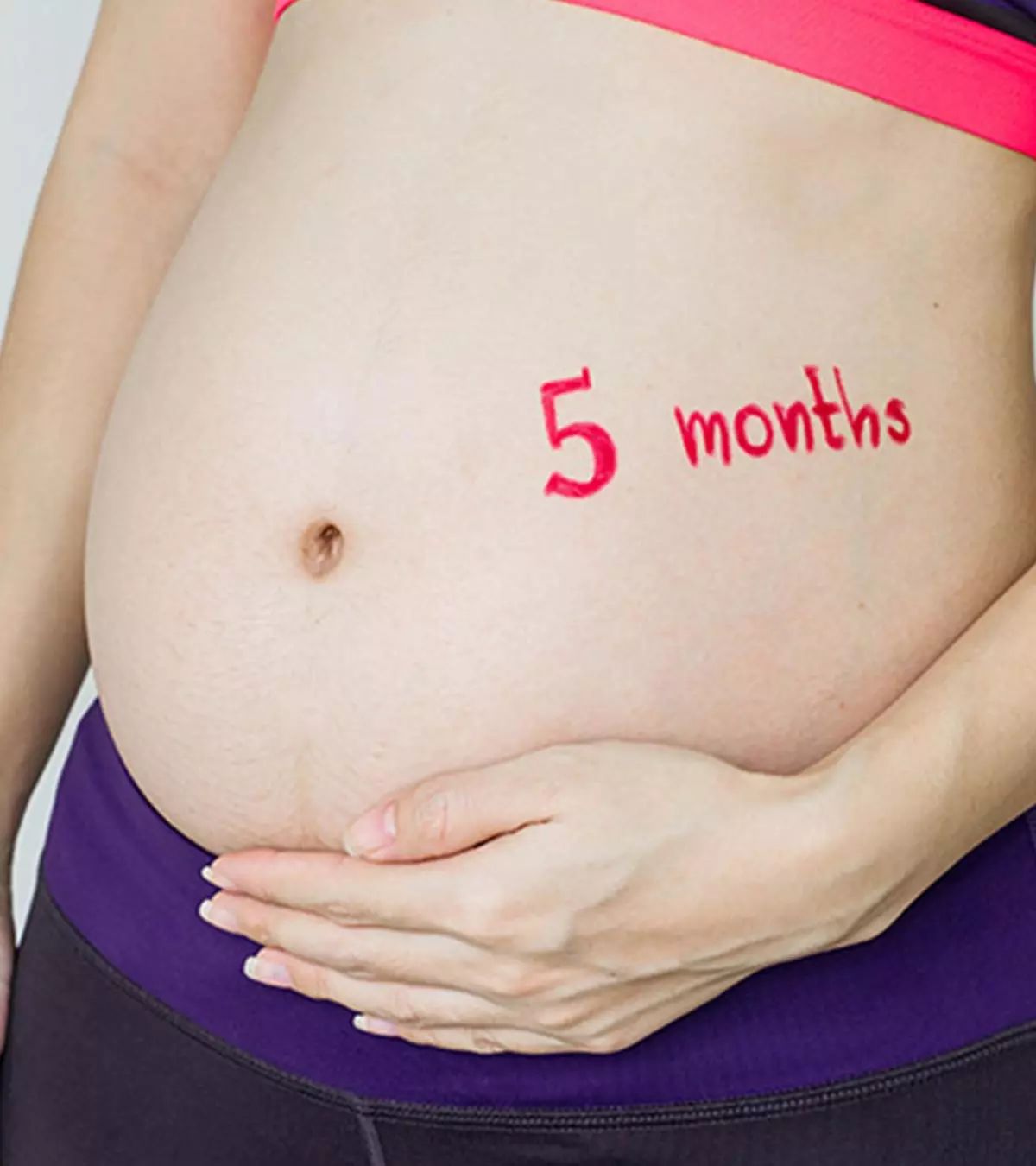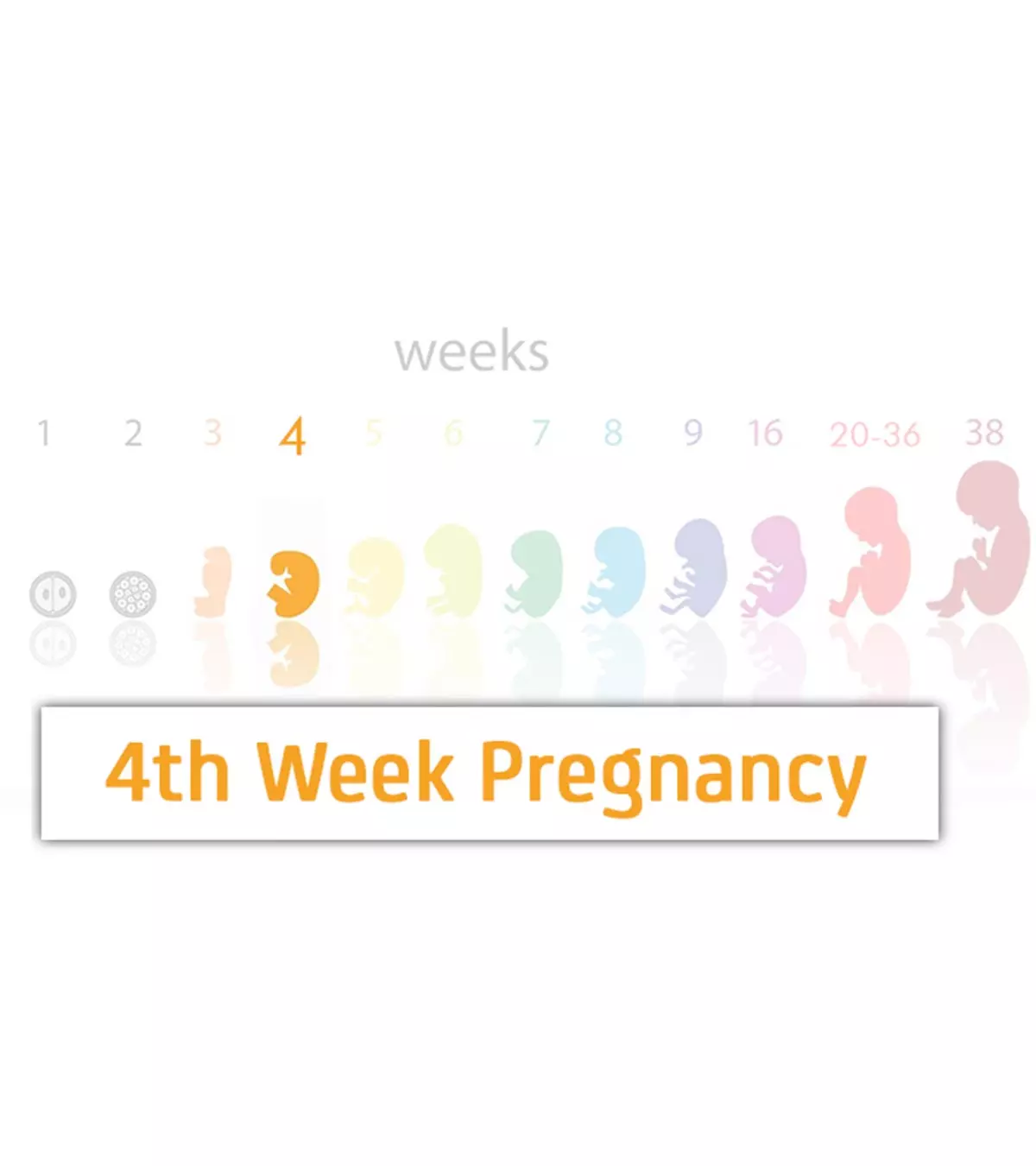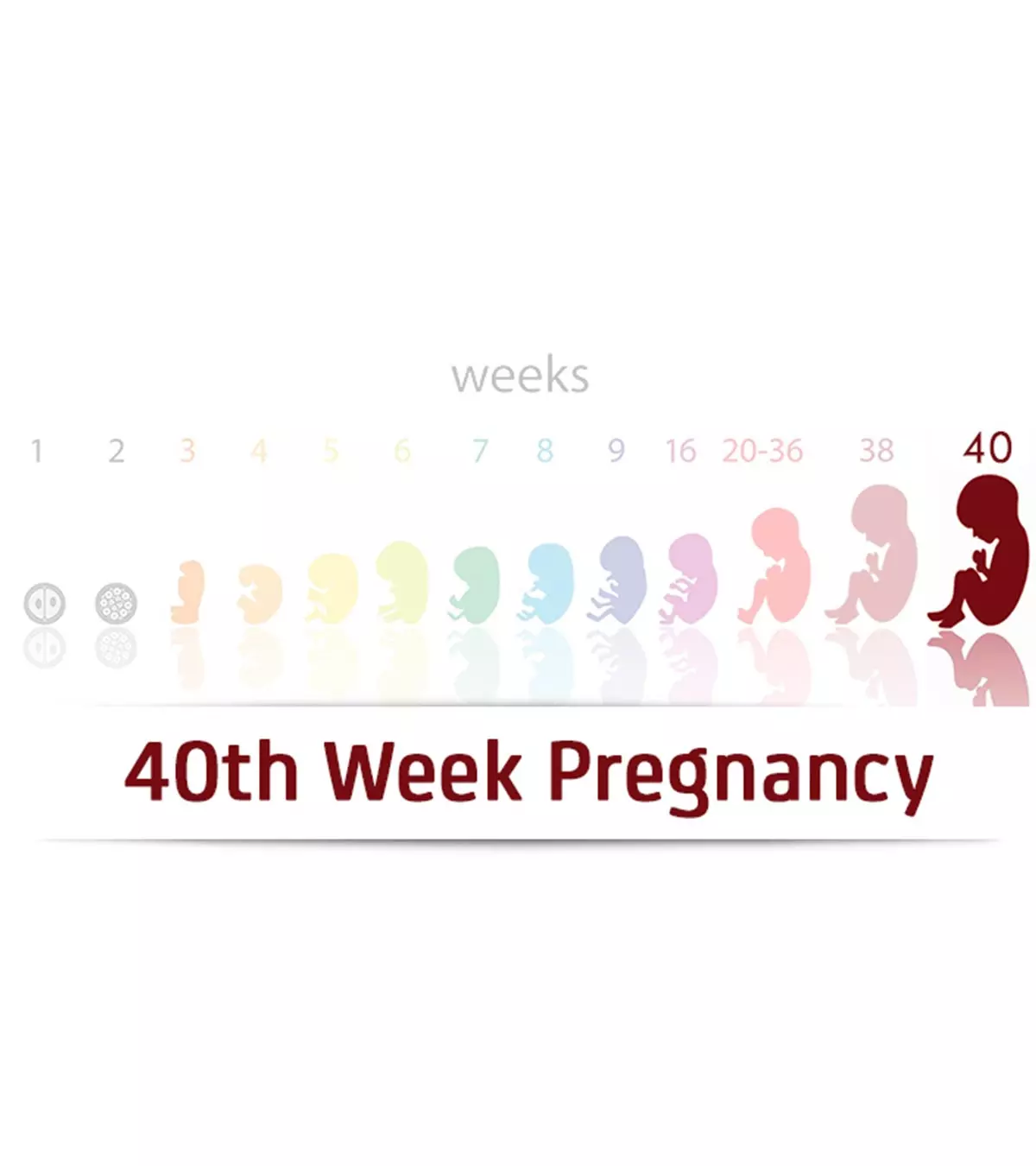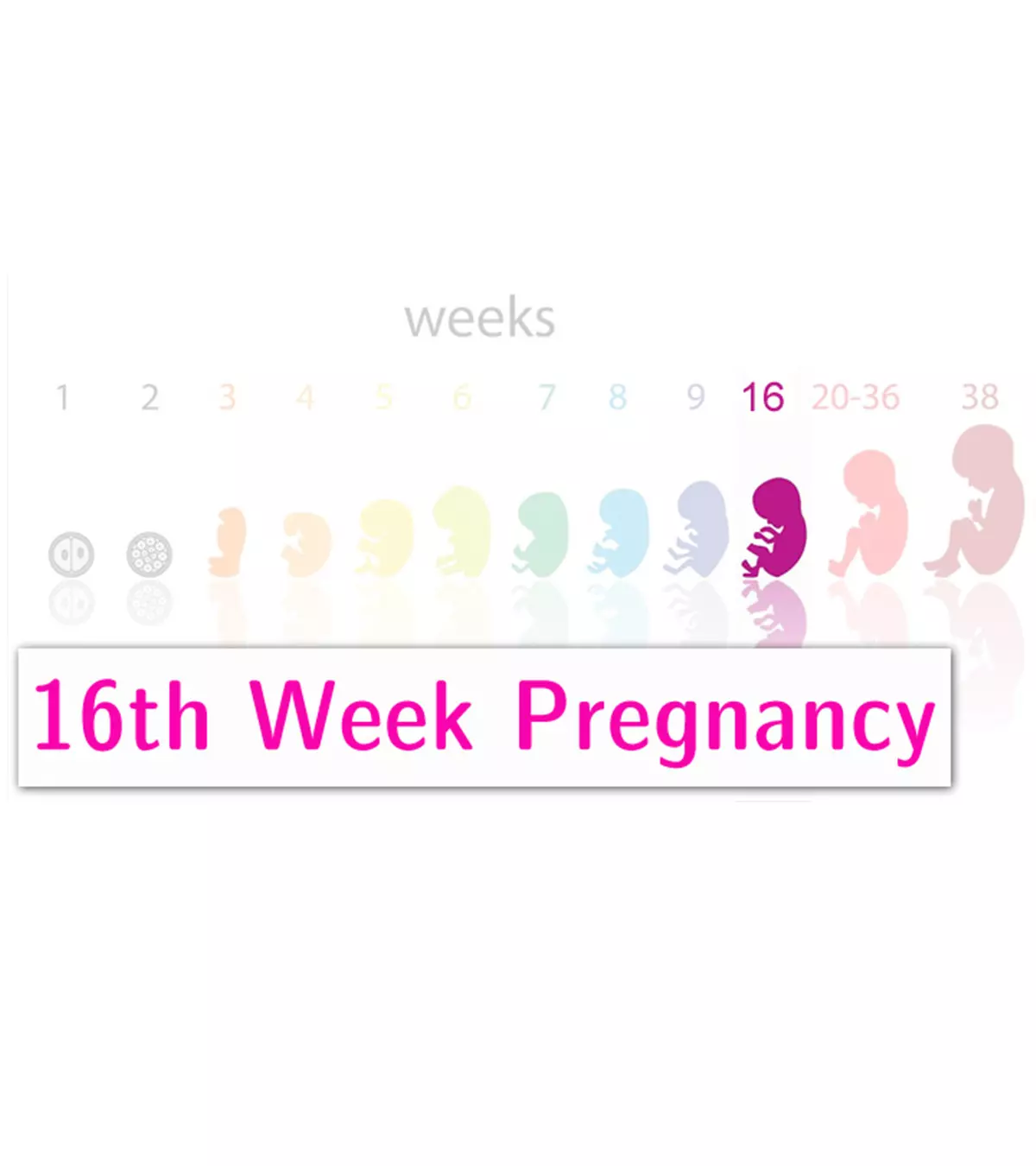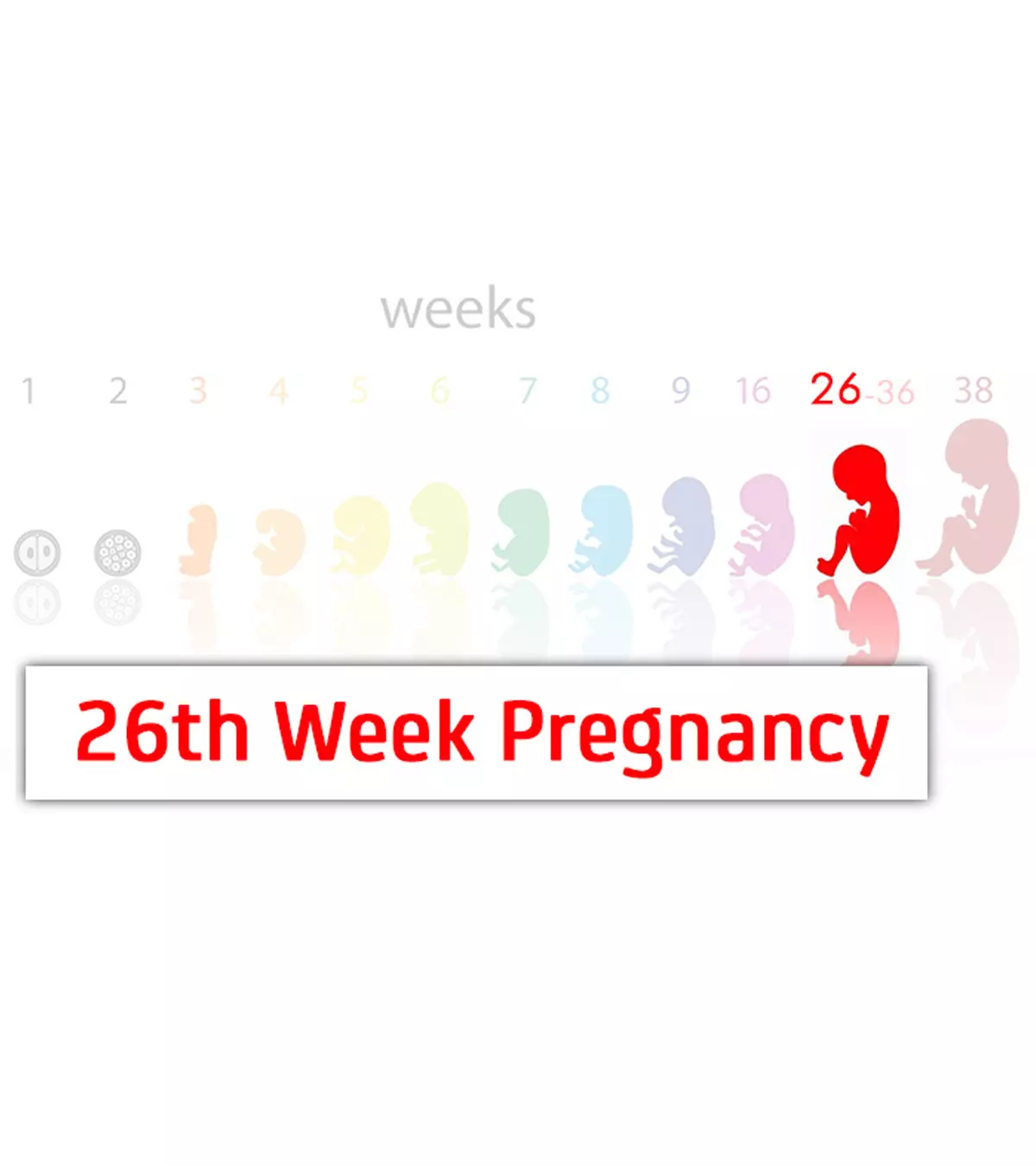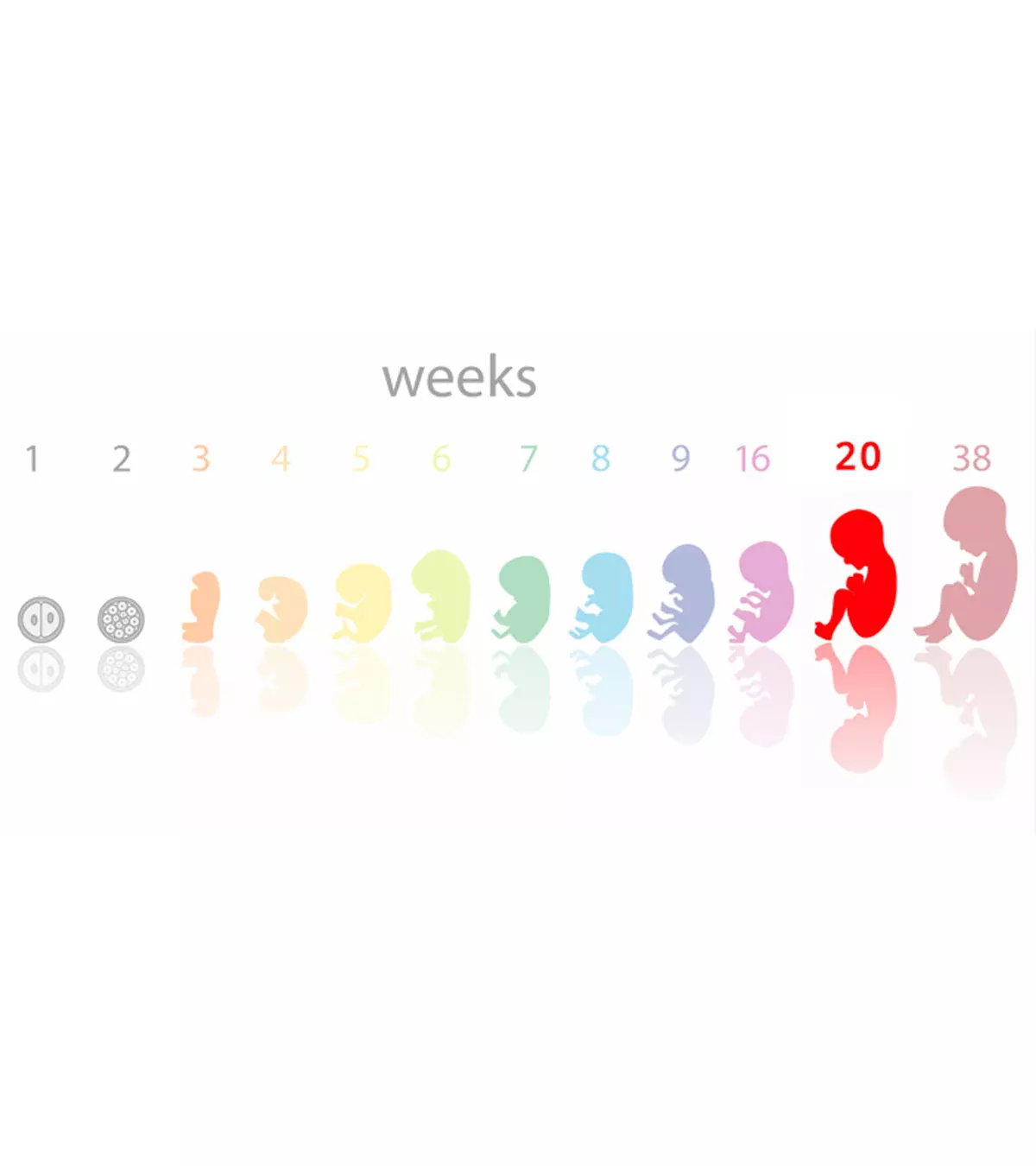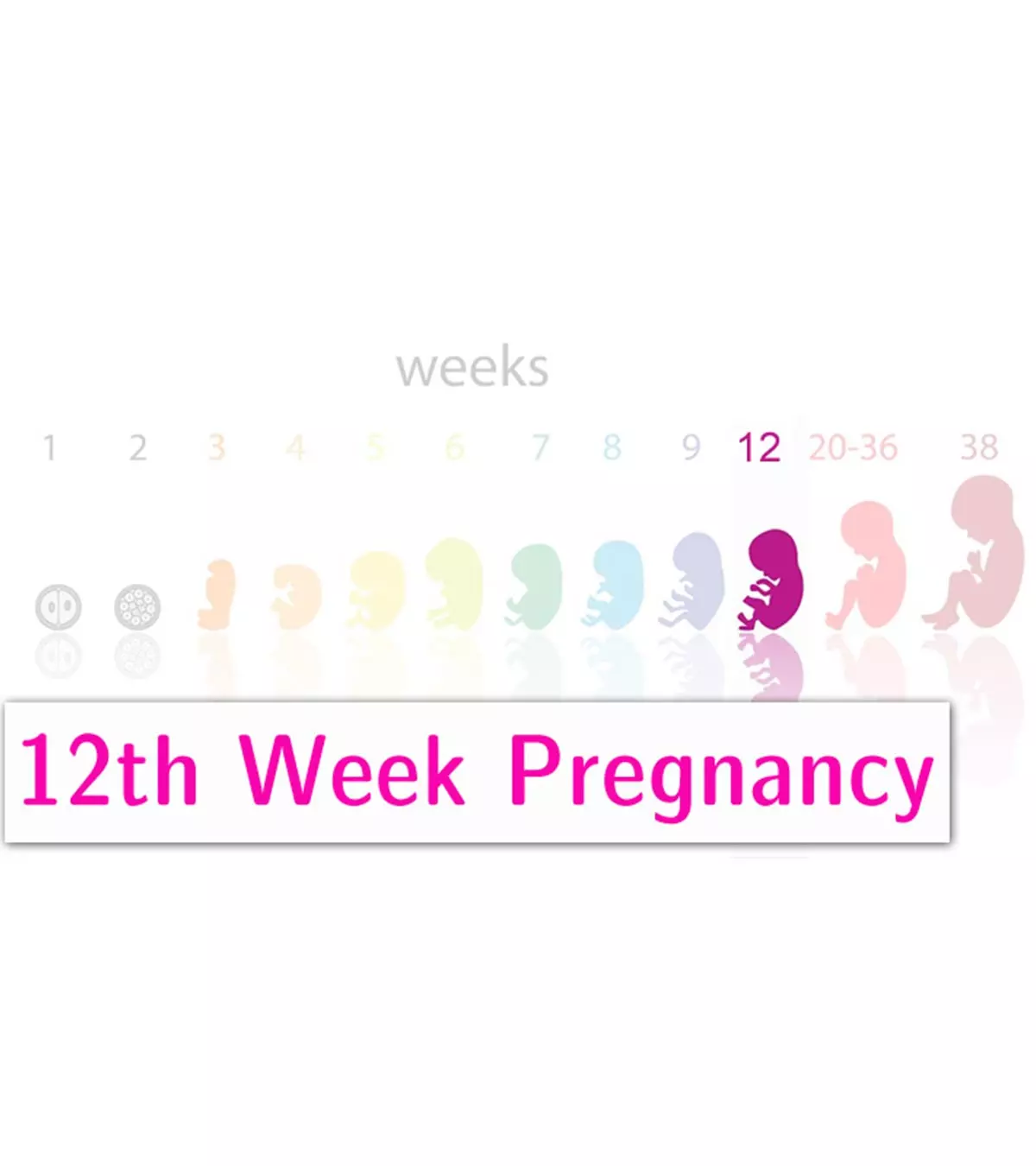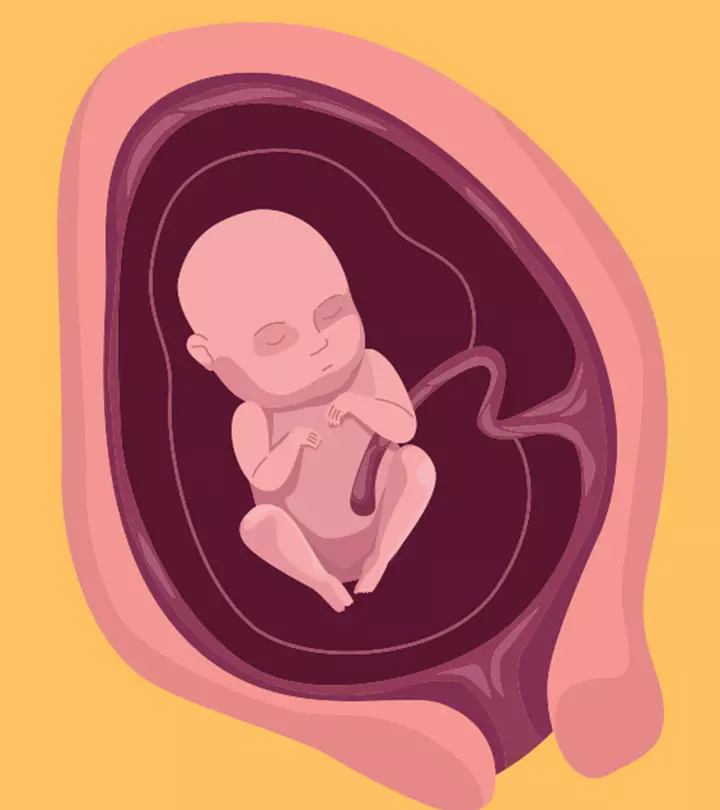
Image: ShutterStock

Your second trimester, which occurs between weeks 13 and 16, begins when you’re 4 months pregnant. At this stage, you may go through many emotional and physical changes. You may also feel more energetic, and your risk of having a miscarriage will decrease by this month.
This post explains the symptoms you may experience in this month, how big your belly may become, your baby’s development, diet tips, what you can expect when you visit your doctor, and some measures to keep yourself healthy. It also addresses some common concerns you should look out for in the fourth month of gestation.
Key Pointers
- The fourth month of pregnancy is part of the second trimester and is characterized by various physical and hormonal changes in the body.
- Constipation, vaginal discharge, and bleeding gums are common symptoms during this period of pregnancy.
- The fetus at this stage has functional kidneys, growing muscles and bones, and distinctive fingerprints.
- It is recommended to maintain physical activity and get sufficient rest during this phase of pregnancy.
- Smoking, alcohol consumption, and taking hot baths should be avoided as they can negatively affect the development of the fetus.
What Symptoms Do You Experience In The Fourth Month Of Pregnancy?
As you enter the fourth month, most side effects of the first trimester reduce and new 4th-month pregnancy symptoms and changes occur (1) (2):
- Constipation: The increasing progesterone levelsiA hormone produced by a woman's ovaries that help in conception and regulation of menstrual cycles alter the digestion process, causing delayed bowel movements and constipation. Drinking lots of water and including a high fiber diet could alleviate this discomfort and ease digestion. Adding olive oil and prunes to your 4th month of pregnancy diet can be helpful. If it is a normal, uncomplicated pregnancy, walking 30 minutes a day is a good way for constipation relief.
- Frequent urination: Your expanding uterus applies additional pressure on the bladder. You might, therefore, have a frequent urge to urinate. If there is a fever or pain during urination or lower abdominal pain,consult with your doctor.
- Shortness of breath: Your growing belly may also apply pressure on the lungs, making it difficult to breathe properly. It is, therefore, common to experience shortness of breath or rapid breathing. If this condition limits your activities, you need to visit a cardiologist.
- Heartburn: With the growing bump, there is additional pressure on the digestive system. This could also push the stomach acids upward, causing heartburn. Dietary changes can help reduce the stress on the digestive tract according to specialists in obstetrics. For instance, Dr. Kimberly Langdon, a US-based obstetrician/gynecologist, says, “Nausea subsides in the fourth month of pregnancy, causing expecting mothers to eat more than they should. However, heartburn and other digestive issues such as constipation occur during this time. To avoid discomfort, it is best to eat small, frequent meals rather than indulging all at once.”
- Bleeding gums: Pregnancy hormones soften the gums and increase their sensitivity. This would cause bruising and bleeding while brushing the teeth. Always check with your doctor.
- Nosebleeds: Increased blood supply in the nose puts more pressure on the tiny blood vessels inside the nose. This may make them more susceptible to rupture, resulting in a nosebleed.
- Morning sickness: Although common in the first trimester, nausea and vomiting can be experienced in the later months of pregnancy too.
- Vaginal discharge: Hormonal changes in the body may also lead to increased white vaginal discharge.
Body Changes During Fourth Month Of Pregnancy
The most evident change you notice is a bigger belly or a visible baby bump. Here are the other physical changes you may notice in the 4th month.
- Skin changes: Your skin is also likely to undergo some changes during pregnancy. The increasing pregnancy hormones could cause blotchy skin in some. Take care of the skin using mild cleansers, moisturizers, and lotions.
- Breast changes: From the beginning of the fourth month, the nipples and areola are likely to become darker. Also, the veins will become more prominent as the blood circulation increases.
- Edema: Swelling in the feet and ankles is likely to develop from the fourth month of pregnancy that may last until your due date. Taking frequent breaks in between and avoiding standing or sitting for extended periods can help alleviate the swelling. If there is significant edema of face and hands, you should visit your doctor.

Image: IStock
- Varicose veins: Increased blood volume in the body can enlarge the veins in the legs, thus causing varicose veins.
There is no need to worry about these mild changes, as they are common during this time of pregnancy.
How Big Is Your Belly In The Fourth Month?
By the end of the fourth month of pregnancy, your uterus is about the size of a head of cabbage. The top of the uterus lies below the belly button. Your 4-month pregnant belly may show a little bit.
Baby’s Development In The Fourth Month Of Pregnancy
While you experience the above changes, your developing baby also undergoes many changes that are listed below (3) (4).
| BODY PARTS | DEVELOPMENTAL STAGE |
|---|---|
| Facial features | Ears, eyes, nose, hair, and other facial features become more pronounced |
| Ears | Ear bones begin to get hard; outer ears develop |
| Neck | Formed |
| Skin | Transparent skin with visible veins; fat cells start to form under the skin |
| Lungs | Begin to develop but not functional as respiratory organs |
| Musculoskeletal system | Bones and muscles are developing |
| Hair | LanugoiSoft, thin hair that covers the body of the fetus and usually falls just before birth and gets replaced by normal hair covers the body that offers protection to the soft skin |
| Eyelashes | Start developing |
| Fingerprints | Become unique |
| Tail | Completely disappears |
| Arms and legs | Can flex |
| Kidneys | Functional |
How Does A Fourth Month Baby Look Like In The Womb?

Image: Shutterstock
The fetus has transparent skin, well-formed fingers, and toes at this stage. The fetus’s eyes are still developing since it can react to light while the eyelids are closed and other organs are still developing. At this point, the fetus is the size of an orange weighing about six ounces and measuring six to seven inches.
Baby’s Movement In The Fourth Month
The baby tends to move four or more times in an hour at this stage. You may feel the movements as light sensations along your lower abdomen. They are called quickening movements and are similar to a fluttering or bubbling in the abdomen (5). Marisa, a mom with two kids, talks about how feeling her baby move at 16 weeks of her second pregnancy was one of her happiest moments. She says, “I started feeling the baby move about a week or so ago. It seemed very early. I don’t feel it often but occasionally I can feel the baby and see my stomach move. My husband has even felt the baby (i).”
Women feel these fetal movements later when they are in their first pregnancies than women with second or subsequent pregnancy.
What Do You Need To Know In Your Fourth Month Of Pregnancy?
Here are a few things to remember as you enter into your second trimester (6).
Dos During The 4th Month Of Pregnancy
- Continue to perform regular exercises after the doctor’s approval. Go for regular walks, yoga, swimming, or any other workout of your choice to promote safe and easy delivery.
- Sleep on your left side, using cushions around your side and between your legs for comfort. It could also improve blood circulation to the developing fetus.
- Nosebleeds, stuffy nose, and blocked ears are common during the 4th month. Carry enough tissues and keep the needed medication with you at all times.
- Buy some maternity clothes as your abdominal muscles start to stretch rapidly. Your regular clothes could be tight and uncomfortable now.
- Indulge in sex as maintaining intimacy with your partner is very important. However, take your doctor’s advice beforehand.
 Did you know?
Did you know?
Image: IStock
- Go for a regular dental check-up to avoid oral complications with bleeding gums.
Don’ts During The 4th Month Of Pregnancy
- Stay away from alcohol as the fetus could get fetal alcohol syndromeiA disorder caused by the consumption of alcohol during pregnancy. (FAS).
- Avoid cleaning cat litter as it could increase the risk of allergies and toxoplasmosisiA parasite infection brought on by ingesting raw or undercooked meat or coming into contact with cat poop. .
- Do not use hot tub baths or saunas as high temperatures might be dangerous for the growing fetus.
- Quit smoking as those who smoke are likely to give birth to low weight babies that are at a higher risk of disabilities.
Diet Tips For The 4th Month
- Be careful of what you eat and how much you include. Include enough vitamins and supplements in your diet since the growing baby requires proper nourishment (7).
- Include iron-rich foods such as fish, meat, liver, tofu, soybeans, nuts and seeds, brown rice, dark green leafy vegetables, eggs, and dried fruits. They help in meeting the increasing iron requirement.
- Eat fiber-rich foods such as oatmeal, barley, flaxseeds, chia seeds, almonds, pistachios, pecans, broccoli, green peas, sweet corn, raspberries, strawberries, apples, bananas, figs, and pears.
- Calcium rich foods, including milk, yogurt, cheese, kale, watercress, okra, broccoli, and almonds, are essential for healthy fetal weight and bone development.
- Zinc-rich foods include lamb, beef, wheat germ, spinach, mushrooms, squash, and pumpkin seeds. They help in the development of a healthy immune and nervous system.
- Vitamin C foods include bell peppers, sweet potatoes, tomatoes, cauliflower, broccoli, leafy greens, and cabbage. It is a key nutrient for iron absorption.

Image: Shutterstock
- Have foods rich in omega fatty acids, including vegetable oils, soybeans, walnuts, almonds, sardines, chia, and flax seeds.
- Select folic acid-fortified foods, such as enriched bread, pasta, flour, rice, grain products, and cereals.
- Have at least five portions of fruits and vegetables every day.
- Include protein foods such as nuts, seeds, legumes, meat, chicken, soybeans and quinoa, and carbohydrates, including rice, bread, pasta, and potatoes.
- Avoid refined flour (Maida) as it can increase blood sugar levels.
- Avoid ocean fish such as king mackerel, white tuna, and swordfish that contain mercury. Include freshwater fish (trout and salmon).
- Avoid soft cheeses (Brie) and blue cheese (camembert) as they might cause food listeria poisoning. Include only hard cheeses such as cheddar and parmesan. According to the World Health Organization (WHO), pregnant women are 20 times more susceptible to listeriosis than other healthy adults.
- Do not include raw or undercooked eggs. Eat only properly cooked or pasteurized eggs.
- Avoid having excess tea or coffee as overindulging in caffeine is harmful.
- Drink enough water – pregnant women need to have at least two to three liters of water every day.
- Avoid spicy foods, fried foods, and foods containing excessive salts and sugars.
What To Expect During Your Visit To OB/GYN?
You should visit your doctor more frequently by the time the baby is fourth month old in gestational age to check up on the health and development of the baby. Your doctor will usually recommend the following tests (4) (8).
- Physical examination: Your weight and blood pressure are checked. Also, parts such as the breasts, abdomen, and vagina are examined.
- Ultrasound scan: This is conducted to analyze the baby’s development and fetal position.
- Heartbeat: Doppler ultrasound is used to check the fetal heartbeat.
- Alpha-fetoprotein screening: This is done around 16 weeks of pregnancy to screen the presence of Down’s syndrome or spina bifida. But there are more accurate tests that can be done as early as eight to nine weeks of pregnancy. Always ask your doctor.
- Triple test: Also referred to as Bart’s test, triple test screens for hormones such as estriol and hCG in the blood
- Edema test: The measure of swelling is examined as abnormal swelling indicates gestational diabetes, preeclampsia, or blood clotting.
 Quick fact
Quick factUltrasound During The Fourth Month
The 4-month pregnancy ultrasound scanning determines the fetal gender as external genitals would have developed by this stage (9). It can also show the facial features the baby had developed, including the forehead, eyes, and nose. It could, therefore, determine the major physical defects in the baby.
What Are The Common Concerns During The Fourth Month Pregnancy?
Certain changes can be worrisome for you and your partner during the 4th-month pregnancy. To better understand them, discuss it with your doctor sooner.
- An increase in appetite and weight gain is common, and also your likes and dislikes for foods may change starting from this period.
- Constipation and heartburn are common, but you should consult your doctor before using any medicine for it.
- You should be careful with sex if you have a history of high-risk pregnancy or a miscarriage.
Tips For Dads-To-Be
The dad-to-be also has to do certain things to understand what the pregnant mom is going through. A few things he can do to enhance prenatal care include:
- Help with household chores, as it might get difficult for you to manage home and work.
- Understanding the physiological and psychological changes that you go through. Understand how the baby progresses over the period and talk to your doctor for any suggestions.
- Communicate with your partner to ensure you are both on the same page about the pregnancy.
- Discuss with other dads or dads-to-be about his fears and feelings and get some helpful tips.
Frequently Asked Questions
1. Is it normal to not feel the baby move at four months?
You may feel your baby move for the first time during the fourth month of pregnancy. However, every pregnancy is different; some women may experience their baby moving only when they are closer to 20 to 22 weeks of pregnancy. Consult your doctor if you have not felt your baby move by 24 weeks (10) (11).
2. How will my stomach feel in the fourth month of pregnancy?
Unless you have twins, you will not notice or experience any specific changes in your belly in the fourth month of pregnancy. However, rising progesterone levels can slow down your digestion, making you feel bloated. Several women may also experience heartburn, indigestion, and constipation.
3. Does stomach pain occur in the fourth month of pregnancy?
“Stomach pain during the second trimester (fourth to the sixth month) is considered normal because of the stretching of the round ligament that supports and anchors the growing uterus. So, this is not something to be worried about, unless the pain is severe and associated with cramps and bleeding,” Dr. Langdon opines.
4. What is the baby doing at 4 months pregnant?
At four months of gestation, your babies have all their joints working. They can wiggle their fingers and toes. They may even be gripping the umbilical cord. They are capable of flexing their muscles and limbs and making facial expressions with their face. However, they can’t control them yet (15).
Your body undergoes many changes when you are four months pregnant, and it is also the beginning of the second trimester. This is an exciting month for a mother as she may experience slight fetal development and movements. In addition, the anticipated gender reveal may also happen this month. However, the rapid growth of your baby during this stage brings about a new set of discomforts as the side effects of the first-trimester fade away. Following a healthy lifestyle, an antenatal care plan, and sticking to a good diet could help you alleviate a few of those discomforts. Ensure you have your checkups on time and clarify all your doubts during the doctor visits.
Infographic: Diet Tips For The Fourth Month Of Pregnancy
During the fourth month of pregnancy, expectant mothers must maintain a healthy and balanced diet. The infographic below provides a list of food items that should be included and avoided during this time. Give it a read and share it with others as well. Additionally, prioritize your overall health and well-being with regular exercise and enough rest.
Some thing wrong with infographic shortcode. please verify shortcode syntax
Illustration: 4 Months Pregnant: Symptoms Belly Size & Baby Development

Image: Dall·E/MomJunction Design Team
Observe your baby’s incredible growth and development during the fourth month. Take note of interesting developmental milestones such as their ability to roll over and their first laugh.
Personal Experience: Source
MomJunction articles include first-hand experiences to provide you with better insights through real-life narratives. Here are the sources of personal accounts referenced in this article.
i. Baby is growing; 4 months alonghttps://myfruitfullife1.blogspot.com/2013/08/baby-is-growing-im-not-4-months-along.html
References
1. Guide for First Time Parents; Regis College
2. Stages of pregnancy; U.S. Department of Health and Human Services (2018)
3. How Your Fetus Grows During Pregnancy; American College of Obstetricians and Gynecologists (2018)
4. Pregnancy at week 16; Pregnancy, Birth and Baby
5. Quickening in Pregnancy; Cleveland Clinic.
6. Safe, Healthy Birth: What Every Pregnant Woman Needs to Know; National Center for Biotechnology Information, U.S. National Library of Medicine
7. Nutritional Needs; PREGNANCY & BREASTFEEDING; Clemson Cooperative Extension (2008)
8. Common Tests During Pregnancy; University of Rochester Medical Center
9. First-trimester determination of fetal gender by ultrasound; National Center for Biotechnology Information
10. Baby movements during pregnancy; Pregnancy, Birth and Baby
11. Your Pregnancy Matters Feeling your baby move during pregnancy; The University of Texas Southwestern Medical Center
12. What happens in the fourth month of pregnancy?; Planned Parenthood Federation of America
13. Sex during pregnancy; March of Dimes
14. You and your baby at 16 weeks pregnant; NHS
Community Experiences
Join the conversation and become a part of our nurturing community! Share your stories, experiences, and insights to connect with fellow parents.
Read full bio of Dr. Mozhgan Sayyad
- Dr. Kimberly Langdon is a gynecologist with 19 years of experience wherein she delivered more than 2,000 babies. She is currently working as vice-president, product development and research at Physician Integrative Laboratories in the US. She did her doctor of medicine from the Ohio State University.
 Dr. Kimberly Langdon is a gynecologist with 19 years of experience wherein she delivered more than 2,000 babies. She is currently working as vice-president, product development and research at Physician Integrative Laboratories in the US. She did her doctor of medicine from the Ohio State University.
Dr. Kimberly Langdon is a gynecologist with 19 years of experience wherein she delivered more than 2,000 babies. She is currently working as vice-president, product development and research at Physician Integrative Laboratories in the US. She did her doctor of medicine from the Ohio State University.
Read full bio of Rebecca Malachi
Read full bio of Swati Patwal
Read full bio of Aneesha Amonz






